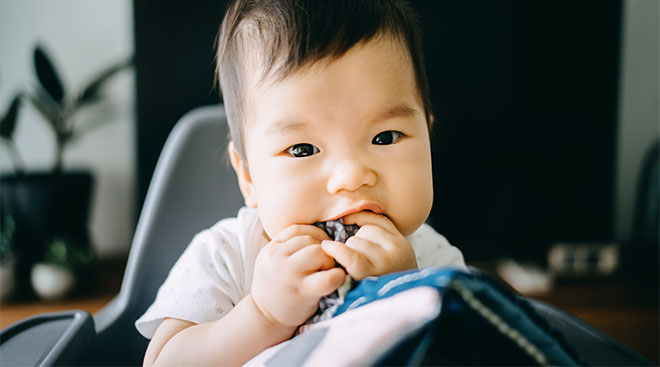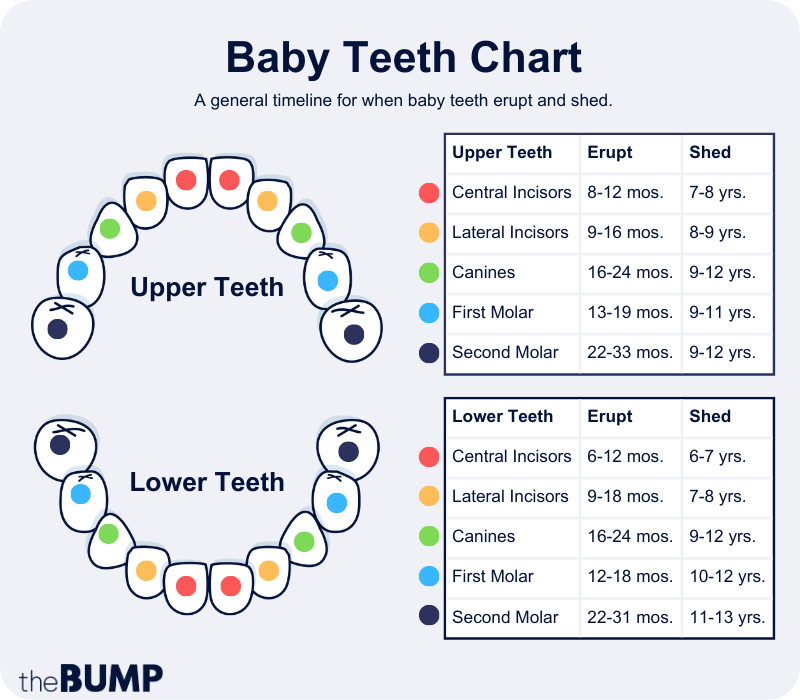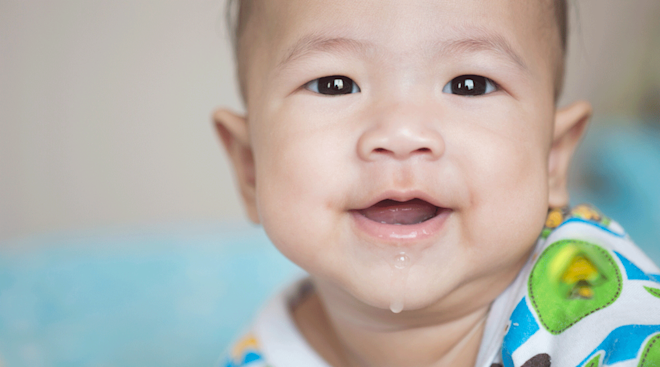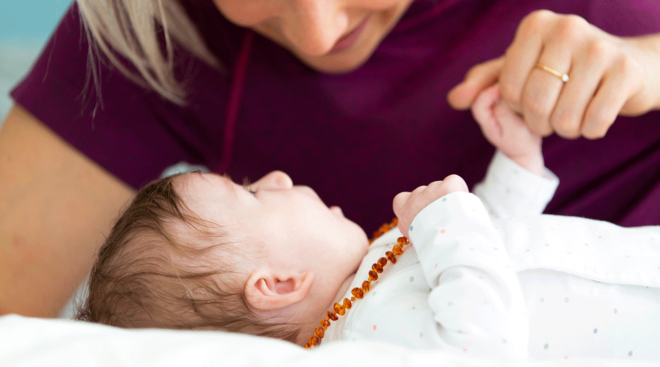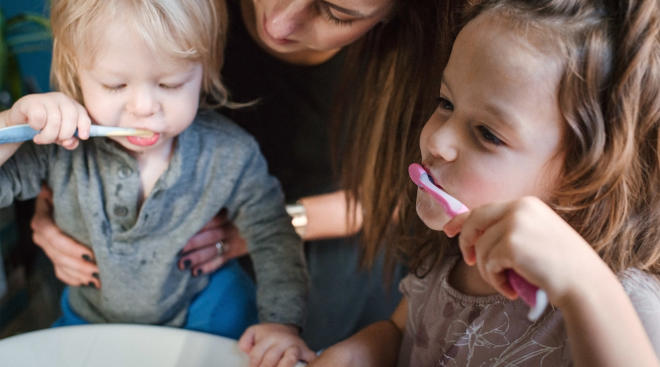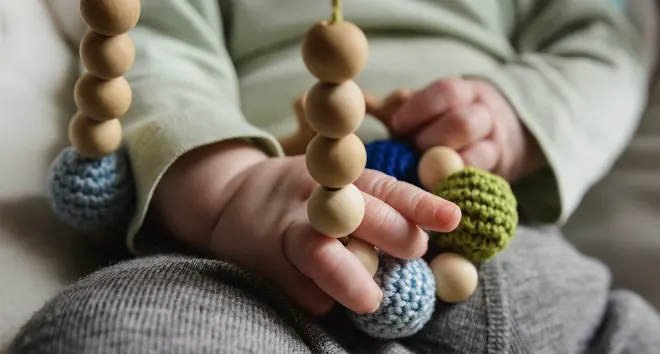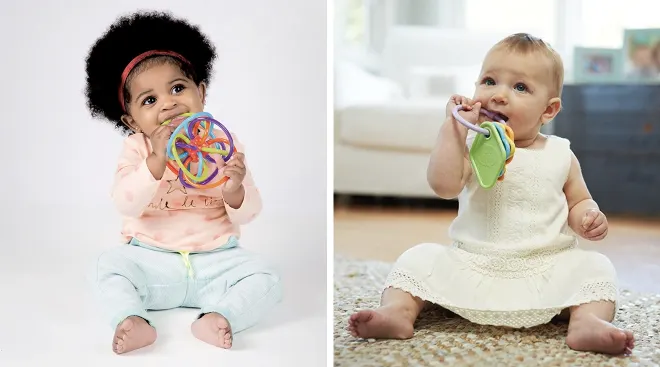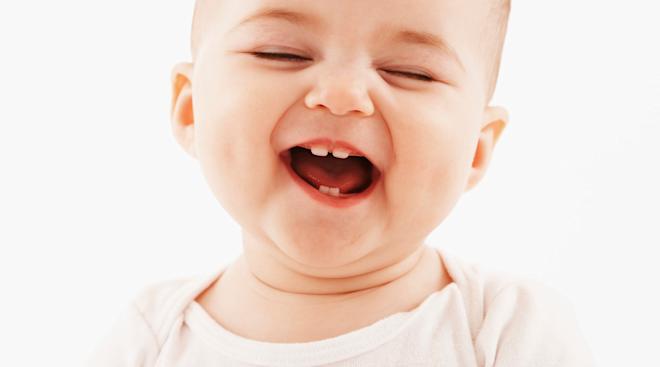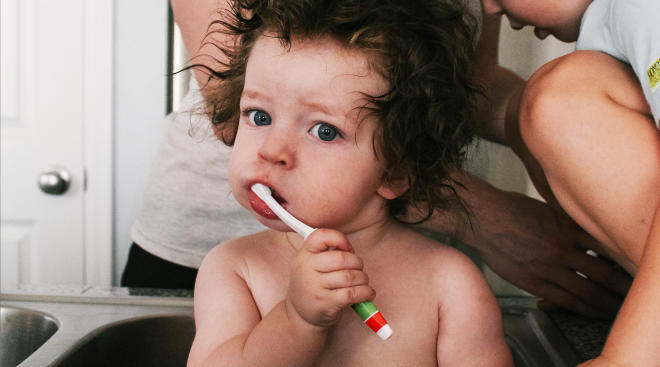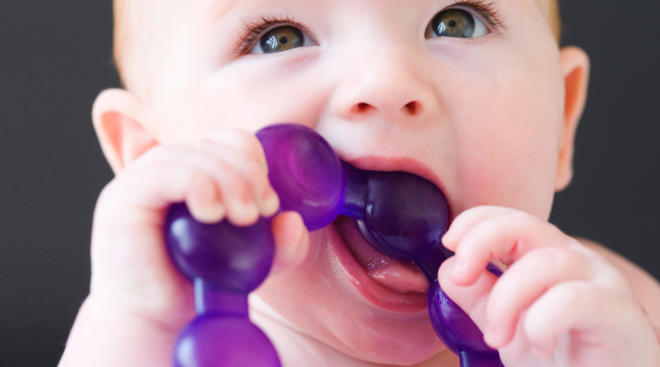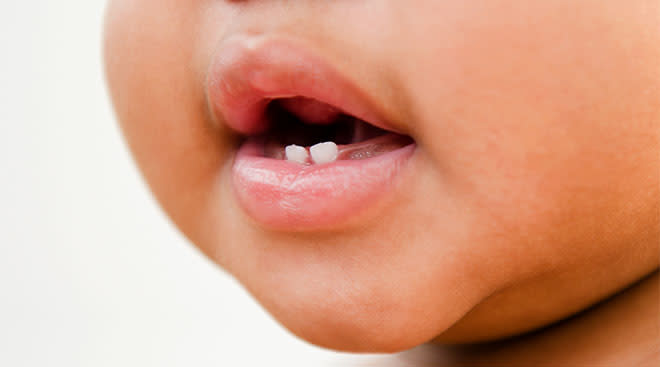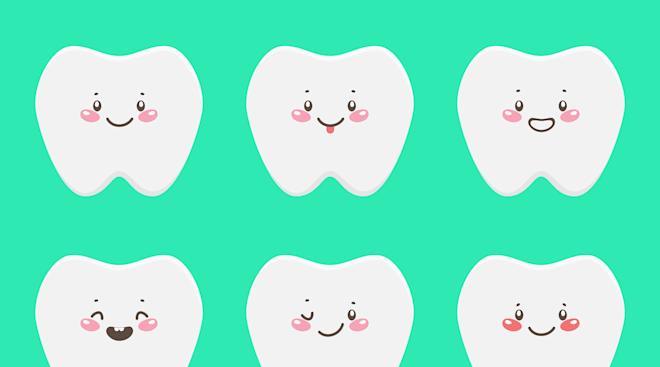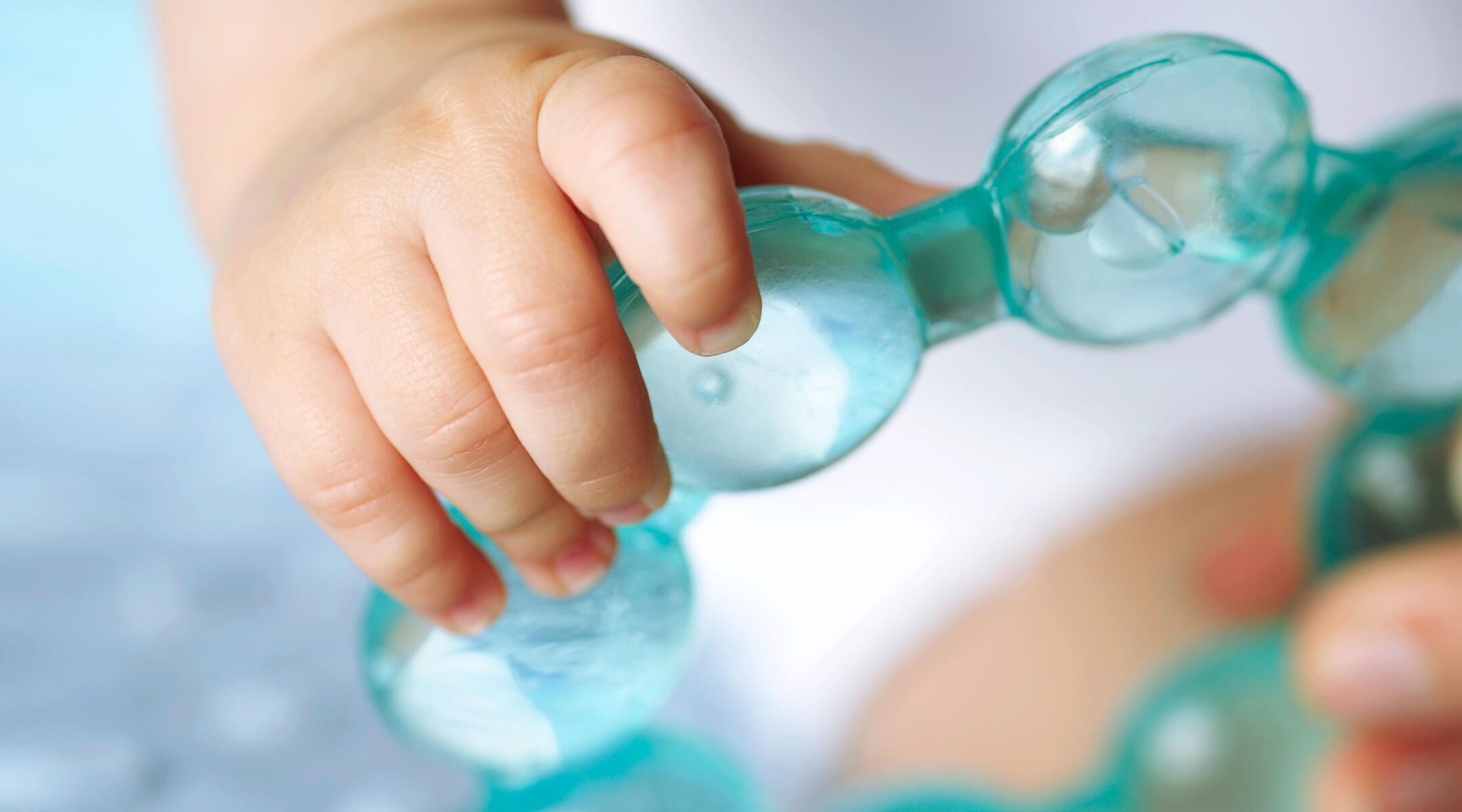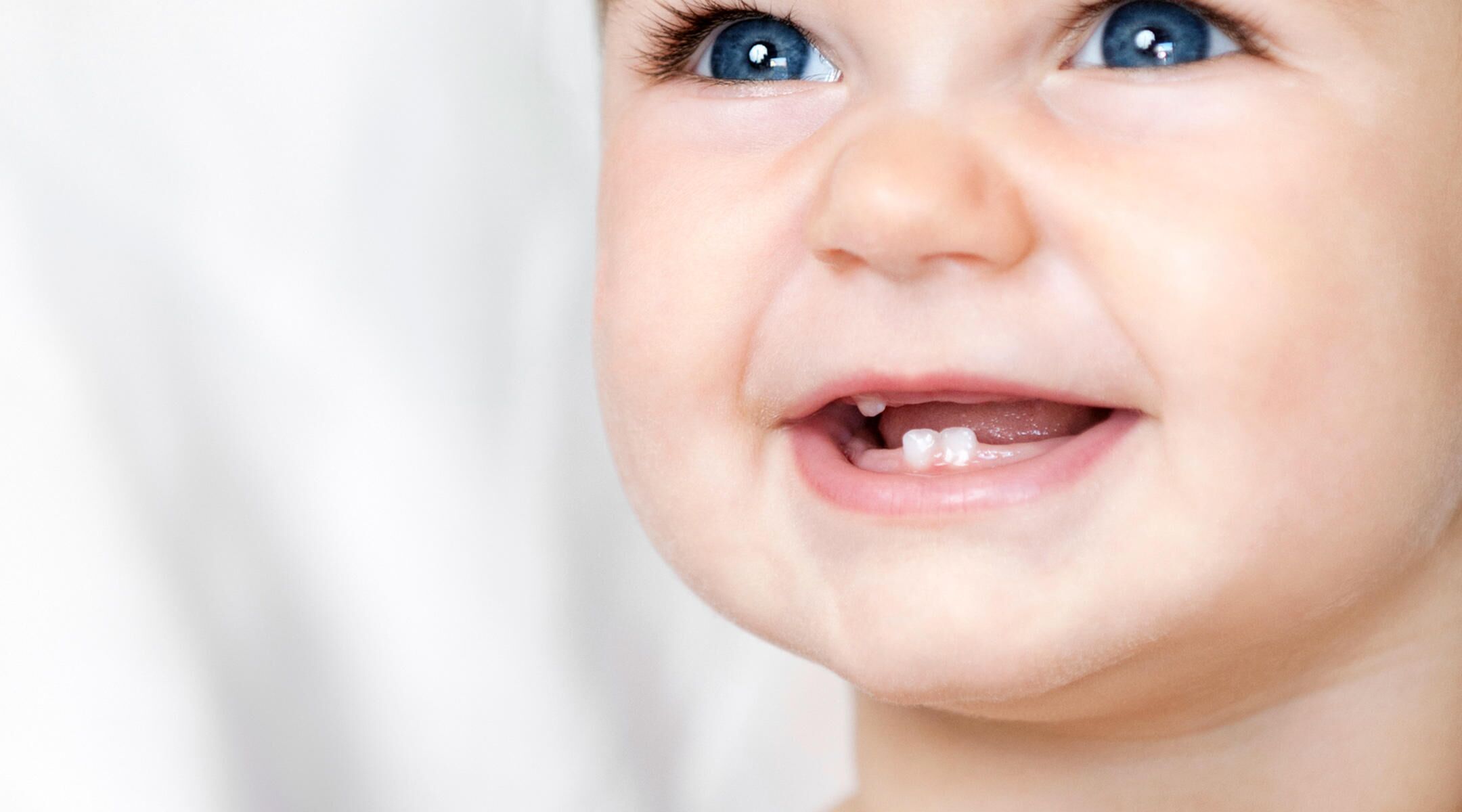When Does Teething Start in Babies?
Snap as many pictures of baby’s adorable gummy grin while you still can. Those little teeth will crop up in the blink of an eye—and you’ll sure know when it’s about to happen. Teething can be pretty uncomfortable for babies, and they’ll express it the only way they know how—by fussing and crying and not sleeping. If baby is showing their cranky side, you may start wondering if the time for teething has arrived. So when do babies start teething? The truth is, every baby is unique. Still, there’s a general timeline to expect, plus a few important things that all parents should know to make the process easier. Read on for intel.
Babies usually start getting their primary teeth between 3 and 6 months old, says Mark S. Wolff, DDS, PhD, a professor of cariology and comprehensive care at the New York University College of Dentistry. But it’s quite possible that it could happen later too. In fact, some babies may not get their first teeth until they’re about a year old, says Whitney Schutzbank, MD, MPH, a pediatrician at the MassGeneral Hospital for Children in Boston.
Genetics play a significant role in determining teething age, adds Jeffrey Bourne, MD, a pediatrician at Providence Saint John’s Health Center in Santa Monica, California. “It tends to run in families,” he says. “Some families have teeth that come in early, some not until later.” Ashley Lerman, DDS, a board-certified pediatric dentist and founder of Firstgrin, agrees, adding that studies suggest how early babies can start teething may also be influenced by some environmental and nutritional factors during pregnancy, including socio-economic status and physical activity levels. However, she adds “there’s no definitive cause for ‘early’ or ‘late’ teething.”
What is late teething?
Babies are considered late teethers when they reach their first birthday and still have no teeth, Schutzbank says. If your little one is 12 months old and you’ve yet to see any signs of teething, give your pediatrician a call. They can assess the situation during your child’s well visit and may suggest just observing for now or a visit with a pediatric dentist.
When do babies start teething? It’s hard to know exactly, but the order in which baby’s 20 teeth will come in (or “erupt,” in dental lingo) is pretty predictable. As you see from the chart below, the first teeth to break through baby’s soft gums are the middle teeth (central incisors)—you’ll notice the two bottom ones first, followed closely by the two top ones. The next to crop up are the adjacent teeth, and the process continues to work its way toward the back of the mouth, with the molars surfacing last. Baby’s gums are ingeniously rigged so both the upper and lower teeth come in right and left pairs. “The order supports tooth and jaw growth and helps provide for straight teeth,” Wolff says.
During the teething process, the tooth pushes up through the bone and then the gumline. It’s no wonder it hurts! When babies start teething, Lerman and the American Academy of Pediatrics (AAP) say they may have the following symptoms:
- Crying or fussiness
- Increased drooling from their baselines
- Low-grade fever (nothing over 101 degrees Fahrenheit)
- Trouble sleeping
- Swollen or reddened gums
- Short lived loss of appetite
- Desire to rub their cheeks and pull their ears
There’s no clear-cut answer to this question. But in general, babies will grow new teeth every four to six months, and they’ll usually have their complete set of baby teeth by around 24 months, Wolff says.
Wondering how long baby’s teething pain will last? While it’ll take approximately two years for all of their teeth to come in, pain flares up only when the teeth are actually breaking through the gums, and it subsides between episodes. So the severe symptoms usually last just a few days, Schutzbank says. What’s more, children tend to get used to the process over time, according to Bourne. While the symptoms are obvious with the first tooth or two, they become milder as baby’s mouth fills in.
Teething can be uncomfortable for baby, so you’ll want to have some tricks up your sleeve for helping to ease that discomfort as much as you can. If baby seems to be experiencing signs of teething, try some of the easy, reliable at-home remedies below.
- Gum massage: Often, babies find the most relief from gentle pressure on their sore gums, which is why you’ll find them gnawing on anything they can get in their mouths. According to the AAP, a safe way to provide light pressure on the gums is to give baby a gum massage. With clean hands, use your finger pad or knuckle to rub the sore spots in baby’s mouth (just be mindful of any sharp nails). Repeat as often as necessary.
- Teethers: A baby old enough to navigate a teether in their hand and mouth may enjoy using one to put pressure on their gums themselves. Offer a teething ring, pacifier or clean, wet washcloth for baby to chew on. “I like these remedies as they have no side effects and are quite effective,” Schutzbank says.
- Something cold: Cold can help ease discomfort too, but don’t give baby ice or teething rings that have been frozen solid. The AAP notes that these are too hard on baby’s gums. Instead, try putting a teething toy or clean, wet washcloth in the fridge before giving it to baby. You can also offer baby ice pops of breast milk or formula to help with teething pain (just be sure to check in with your pediatrician first!).
- Something to suck on: “Some children like the feeling of sucking when teething,” Schutzbank says. You can try offering a pacifier, baby bottle or a breastfeeding session when infant teething pain is making baby fussy.
- Pain medication: If you’ve already tried the previous soothing methods and baby still seems extremely uncomfortable, you can try over-the-counter pain medication like acetaminophen (Tylenol) as a last resort, Schutzbank says. Ibuprofen is another choice, but should only be given to babies over 6 months. It’s also always a good idea to reach out to your pediatrician before turning to these methods.
Along with these baby teething remedies, Lerman also recommends keeping baby’s chin dry, as increased drooling, which is common during teething, may lead to skin irritation.
What not to use for baby teething pain
Well-meaning friends and loved ones may have a variety of suggestions for how to soothe baby teething pain—but some options may not be safe. Experts say not to use any of the following for baby teething pain:
- Aspirin: This medication should never be given to babies or children as it can cause Reye’s syndrome, “a rare but serious condition that can harm the liver and brain, leading to serious complications and even death,” Lerman says. “To be on the safe side, always choose pain relievers recommended for babies and children, such as acetaminophen or ibuprofen, and always use as directed.”
- Teething gel: Teething gel is not FDA-approved for infant teething, since it offers little to no benefit but can come with serious risks. “I avoid numbing gels as they can numb baby’s throat and lead to choking or aspiration of liquids into the lungs,” Schutzbank says. Plus, numbing gels containing benzocaine, lidocaine or belladonna “have all noted to have adverse side effects for children when swallowed,” Lerman says. This includes a serious and potentially fatal condition called methemoglobinemia, in which not enough oxygen is delivered to baby’s cells.
- Homeopathic teething tablets: These teething tablets are also not FDA-approved and may contain potentially dangerous ingredients, Schutzbank says.
- Teething jewelry: Amber teething necklaces can pose a choking or strangulation hazard to baby, which is why the FDA and AAP strongly advise against using them.
They may not be super pleasant for baby, but signs of teething are usually nothing to be concerned about. However, there are some situations in which you might want to call your pediatrician for infant teething. According to the AAP and Lerman, call the doctor if:
- Baby’s temperature rises above 101 degrees Fahrenheit
- Baby’s fever is persistent
- Baby has diarrhea
- Baby is dehydrated
- Baby won’t eat or drink
- Baby has persistent teething symptoms without signs of an emerging tooth
The general rule of thumb is that if baby seems unusually uncomfortable, is sick or has signs of teething that can’t be soothed, it’s a good idea to call the pediatrician, as your little one may have an illness or infection that needs to be treated. If you think baby needs to be seen, trust your instincts and call the doctor.
“While teething can be a challenging time, it’s a natural process,” Lerman says. “With the right support and care, both baby and parents will get through it.”
Please note: The Bump and the materials and information it contains are not intended to, and do not constitute, medical or other health advice or diagnosis and should not be used as such. You should always consult with a qualified physician or health professional about your specific circumstances.
Plus, more from The Bump:
Jeffrey Bourne, MD, FAAP, is a pediatrician at Providence Saint John’s Health Center in Santa Monica, California, and has been practicing for more than 20 years. He earned his medical degree from the University of Washington and is a fellow of the American Academy of Pediatrics.
Ashley Lerman, DDS, is a board-certified pediatric dentist and the founder of Firstgrin, which provides personalized oral care boxes to help caregivers focus on dental health from a young age, as well as an app to help track baby’s dental growth and development. She received her bachelor's degree from the Rensselaer Polytechnic Institute and earned her doctorate of dental surgery from Columbia University College of Dental Medicine.
Whitney Schutzbank, MD, MPH, is a pediatrician at the MassGeneral Hospital for Children in Boston. Her clinical interests lie in newborn medicine and nutrition. She earned both her medical degree and master's of public health degree from Tulane University School of Medicine.
Mark Wolff, DDS, PhD, is a professor of cariology and comprehensive care at the New York University College of Dentistry in New York City. He received his doctor of dental surgery degree and PhD in oral biology and pathology from Stony Brook University. Before joining the NYU College of Dentistry in 2005, he served as associate dean at Stony Brook University School of Dental Medicine.
Journal of Developmental Origins of Health and Disease, Maternal and early life factors of tooth emergence patterns and number of teeth at one and two years of age, May 2015
American Academy of Pediatrics, Baby Teething Pain, December 2018
US Food and Drug Administration, [Safely Soothing Teething Pain and Sensory Needs in Babies and Older Children]](https://www.fda.gov/consumers/consumer-updates/safely-soothing-teething-pain-and-sensory-needs-babies-and-older-children),,) May 2018
US Food and Drug Administration, FDA warns about safety risks of teething necklaces, bracelets to relieve teething pain or to provide sensory stimulation, December 2018
American Academy of Pediatrics, Teething Necklaces and Beads: A Caution for Parents, December 2018
Learn how we ensure the accuracy of our content through our editorial and medical review process.
Navigate forward to interact with the calendar and select a date. Press the question mark key to get the keyboard shortcuts for changing dates.
































